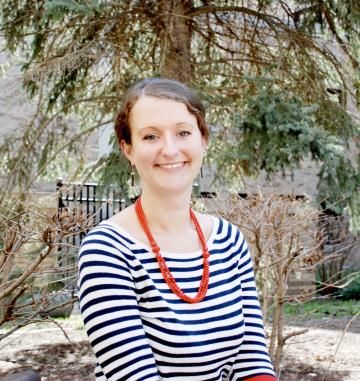
Cite as:
Okune, Angela. 2018. "Louise Bezuidenhout." In STS in "Africa" Personal Careers. In STS in "Africa" in Formation, created by Angela Okune and Aadita Chaudhury. In STS Across Borders Digital Exhibit, curated by Aalok Khandekar and Kim Fortun. Society for Social Studies of Science. August.
Louise Bezuidenhout joined the Institute for Science, Innovation and Society at the University of Oxford School of Anthropology & Museum Ethnography as a research fellow in February 2017. She currently works on the Changing Ecologies of Knowledge and Action (CEKA) project. Louise’s research interests are broadly centred on data sharing issues within the life sciences. In particular, she is interested in how the data produced during scientific experimentation enters into circulation, and how it is valued by potential downstream users. Her work involves a strong empirical component, including a number of ethnographic studies in laboratories in the UK, USA, Kenya, Uganda and South Africa.
Trained in both the life and social sciences, Louise holds a PhD in Cardiothoracic Surgery from the University of Cape Town (South Africa, 2007) and a PhD in Sociology from the University of Exeter (UK, 2014). She also holds an MA in bioethics from KU Leuven (Belgium, 2008). She has previously worked as a research fellow at the University of Exeter and the University of Notre Dame (USA). In addition to her work at InSIS, Louise remains an honorary lecturer at the Steve Biko Centre for Bioethics at the University of the Witwatersrand (South Africa) and is active in various initiatives advocating for better education on Open Data for scientists.
This PECE essay helps to answer the STS Across Borders analytic question: “What people, projects, and products exemplify how this STS formation has developed over time?”
This essay highlights prominant and upcoming individuals working on critical science and technology issues in Africa and is part of a broader exhibit on "STS in Africa."
STS Across Borders is a special exhibit organized by the Society for Social Studies of Science (4S) to showcase how the field of Science and Technology Studies (STS) has developed in different times, places...Read more
AO: This 2017 paper by Bezuidenhout et al. uses qualitative empirical data from a study of lab-based research in Africa to highlight the limitations of a framing of online inequalities and access to ICTs as a "digital divide." They adapt Sen’s ‘capabilities approach’ to highlight the...Read more
Louise Bezuidenhout (May 17, 2018): " I would like to see more work on the informal economies of research." Read more
LB: "The rise in national policies on data sharing"
LB: "CODATA and NEPAD-SANBio"
LB: "I think the open labware ("hackathon") event that we are running in Zimbabwe for undergraduate STEM students would be a good example of this."
LB: "The majority of my work has focused on Open Science and its impact on African science. The majority of my work looks at challenges that African scientists have in accessing free and open data online. These challenges - regulatory, physical and social - have been problematized through extended ethnographic studies of (bio)chemistry laboratories within a number of different countries. I have also recently started work on how the Open Hardware movement may contribute towards strengthening pedagogical systems within African STEM education."
LB: "I use a combination of ethics, economics and STS literature in my work. In particular, authors such as Latour, Jasanoff, Traweek and Wajcman have been influential in my work and thinking."
LB: "My current and former bosses - Javier Lezaun and Brian Rappert."
LB: "STS work in/on Africa is vital to move the discipline away from its very Global North-centric understanding of what constitutes "science". It is also vital to highlight the implicit hegemonies arising from this Northern perspective that are perpetuated within current platforms and policies intended to shape the future of science in the region."
LB: "I'm not sure that the critical work on STS in Africa has as much spread on the continent as it should. The majority of my work is shared through personal connections, feedback seminars and executive summaries to policy makers."
AO: This 2017 article by Bezuidenhout et al. looks at “data engagement activities” by those working in (bio)chemistry laboratories in Kenya and South Africa to examine the extent to which the ideals of the growing Open Science (OS) movement can be realized in a sub-...Read more